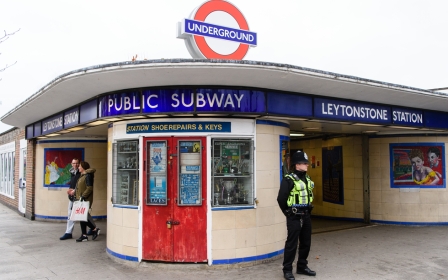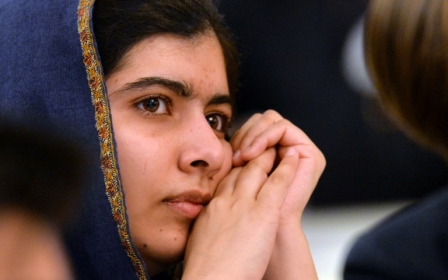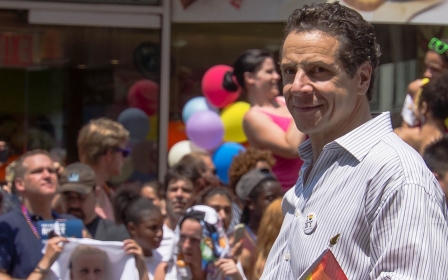America's Republican campaign of fear

“There’s a lot of fear in this country,” said the voiceover to the opening of CNN’s Republican Party (GOP) presidential debate. Yes, the 24/7-cable news giant that trades manufactured fear for ratings, and therefore integrity for advertising dollars, is seemingly unaware of the obvious irony.
While national security was officially set as the central topic for the fifth of nine scheduled GOP debates, the emphasis was fear. This was the debate of fear. Fear of an invisible enemy; fear of not only a terrorist threat barely no one understands but also of a religion that remains alienable to white America.
One part Paris and San Bernardino, and two parts a decade of overt Islamophobia coursing through the body politick, and the anti-Muslim-fuelled fascism of candidates Donald Trump, Ben Carson, Mike Huckabee, Ted Cruz and Rick Santorum combined to make this debate the terror debate.
“Islam is not just a religion. It’s a political government structure,” thundered Santorum – thus implying that Muslims were somehow not afforded protection under the US Constitution. While Huckabee slyly inferred Obama to be a secret Muslim by mocking what he called the president’s “superior ideology,” George Pataki mentioned “radical Islam” more times than Richard Dawkins’ blog.
Candidates were asked not only how they would defeat ISIS but also how they’d utilise American military power in the Middle East. If the stakes weren’t so high, their answers to these questions would make for great comedy.
Santorum told viewers women are too emotionally weak for combat roles, bearing in mind the staunch anti-abortion candidate believes women are emotionally strong enough to raise the child of their rapist.
To tackle what he called “Sunni radicalism,” Ohio Governor John Kasich suggested the US should support Saudi Arabia, otherwise known as the number one sponsor of “Sunni radicalism,” to counter what he called “Shia radicalism”. Again funny, if these debates were an audition for presidency of the local football club and not the United States presidency.
If your debate drinking game involved taking a shot of whisky every time a candidate mentioned “radical Islam” or “Iran,” it’s likely you didn’t make it to work the following morning. Candidates chastised both Obama and Democratic Party frontrunner Hillary Clinton for the Iran nuclear deal. “We want to prevent Iran being able to extend a Shia crescent all across the Middle East,” lectured Kasich.
Given the debate was held in the casino of pro-Israel gambling and media magnate Sheldon Adelson, making it an audition for his campaign money – it came as no surprise the conversation deteriorated into a competition among candidates to see who could hate Iran the most.
“The GOP debate made simple,” tweeted prolific Israel critic and journalist Max Blumenthal. “CNN colluding with Sheldon Adelson to mainstream Islamophobia and intensify an endless war on terror.”
Even when would-be US presidents were unloading on Iran, they were making clear their support lies with those who oppose Iranian influence in the Middle East.
“Look, we will have to work around the world with less-than-ideal governments. The government in Saudi Arabia is not a democracy, but we will have to work with them. The government in Jordan is not perfect, but we will have to work with them,” Marco Rubio said. “But anti-American dictators like Assad, who help Hezbollah, who helped get those IEDs [improvised explosive devices] into Iraq, if they go, I will not shed a tear.”
Hypocrisy, double standards, and empty platitudes punctured the air more times than a Christian fundamentalist talking about Islamic terrorism. Senator Lindsey Graham criticised Obama for handing Damascus to Iran, forgetting he voted for a war that effectively handed Baghdad to Tehran.
When the candidates didn’t engage in double speak, they spoke plainly about how they wouldn’t hesitate to “carpet bomb” the Middle East, suspend constitutionally protected privacy laws, and seize Iraq’s oil.
When asked if he would be as “ruthless” as British Prime Minister Winston Churchill in tolerating “civilian casualties,” Carson casually compared killing thousands of innocent men, women, and children trapped in ISIS-controlled territory to “surgery”, while Cruz didn’t back away from earlier comments to “carpet bomb” ISIS until the sand beneath their feet “glows in the dark.”
Huckabee said the US must “loosen the rules of engagement” in its fight against ISIS, which is a not so subtle dog whistle for those who are sated by bombing more Muslims.
It begs the question: if the death of up to four million Muslims from US led wars since 1990 hasn’t made the US feel more safe, what will?
The answer to that question can only lead to dark places, but with all candidates aware of the boost Trump has received from his pleas to ban Muslims, close mosques, and establish ID badges for 3 million followers of the Islamic faith, the presidential hopefuls all showed their willingness to travel to said places of darkness.
“If Islam really is a religion of peace, Muslims shouldn’t have any problem inviting Americans into their mosques,” goaded Huckabee – implying not only that mosques are un-American, but also that Islam is uniquely threatening. Trump went one further – backing up his earlier promise to kill the family members of those who join ISIS.
The moral practicality of any of these dangerously absurd contentions no candidate explained, but no one in America went backwards professionally, economically, or politically by demonising Muslims – and the 2016 Republican Party presidential race has underscored that very real and terribly frightening fact.
CJ Werleman is the author of Crucifying America (2013), God Hates You. Hate Him Back (2009), and Koran Curious (2011), and he is the host of Foreign Object. Follow him on twitter: @cjwerleman
The views expressed in this article belong to the author and do not necessarily reflect the editorial policy of Middle East Eye.
Photo: Ayla Brown sings the American national anthem in front of Republican presidential candidates (L-R) Ohio Gov. John Kasich, Carly Fiorina, Sen. Marco Rubio (R-FL), Ben Carson, Donald Trump, Sen. Ted Cruz (R-TX) (behind Brown), Jeb Bush, New Jersey Gov. Chris Christie and Sen. Rand Paul (R-KY) before the CNN presidential debate at The Venetian Las Vegas on 15 December 2015 in Las Vegas, Nevada.
New MEE newsletter: Jerusalem Dispatch
Sign up to get the latest insights and analysis on Israel-Palestine, alongside Turkey Unpacked and other MEE newsletters
Middle East Eye delivers independent and unrivalled coverage and analysis of the Middle East, North Africa and beyond. To learn more about republishing this content and the associated fees, please fill out this form. More about MEE can be found here.





